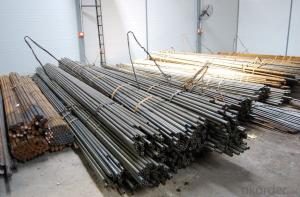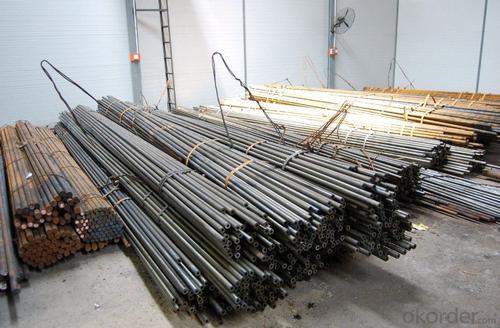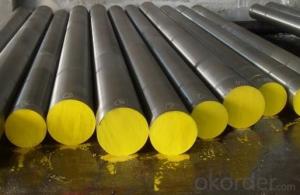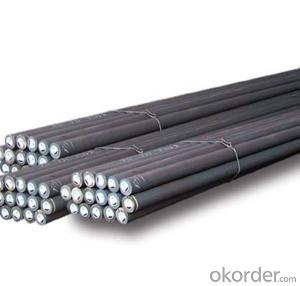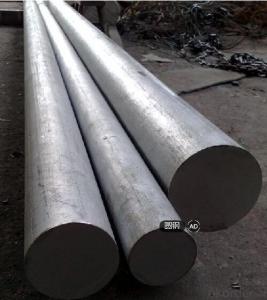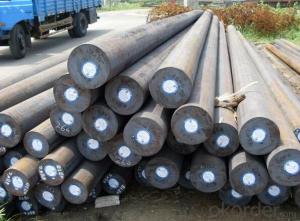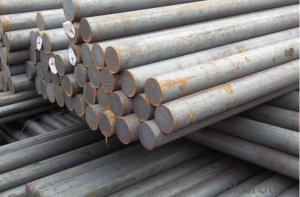Special Steel DIN 1.2365 Steel Round Bar
- Loading Port:
- China main port
- Payment Terms:
- TT OR LC
- Min Order Qty:
- 30 m.t.
- Supply Capability:
- 10000 m.t./month
OKorder Service Pledge
OKorder Financial Service
You Might Also Like
Specification
Specifications
1.2365 steel round bars
1.Diameter:10mm~600mm,
2.Delivery Conditon:annealed, black/turned surface
3.Short Delivery Time
Product information
| 1.2365 steel round bars | |||||||
| Chemical Composition(%) | |||||||
| C | Si | Mn | P | S | Cr | Mo | V |
| 0.28-0.35 | 0.10-0.40 | 0.15-0.45 | ≤0.030 | ≤0.030 | 2.70-3.20 | 2.60-3.00 | 0.40-0.70 |
| Specialty | |||||||
| 1.Excellent machinability, easy to be processed, shorten the time of making molds. | |||||||
| 2. No need to be hardened after processing, free from quenching deformation, cracks and telescopic | |||||||
| 3.High resistance of thermal cracking, good strength in high temperature, long-life of molds. | |||||||
| Use | |||||||
| 1.Light alloy pressure forming; steel forging forming the mold; extrusion die; heavy alloy production of iron as well as guide sleeve | |||||||
| 2. Pressure forming die mold; die casting mold (upper die and lower die inserts, thimble and sleeve cold punching, hot shear and wear parts. | |||||||
| 3. Extrusion die (die, the die pad, the extruder barrel, punch); aluminum, copper, magnesium and the hot forming die; plastic | |||||||
| Heat Treatment | |||||||
| 1. Quench:1030-1060°c by oil or wind cooling | |||||||
| 2. Tempering:600~700 °c | |||||||
| Melting Process | |||||||
| 1. EAF: Electric Furnace+LF+VD(Optional) | |||||||
| 2. ESR: Electric Furnace+LF+VD+Eleroslag Remelted(Optional) | |||||||
| UT Class | |||||||
| According to Standard of SEP 1921/84,100% Volume, Level C/c, D/d or E/e | |||||||
| Tolerance on Quantity | |||||||
| +/-10% Per Size | |||||||
Product show
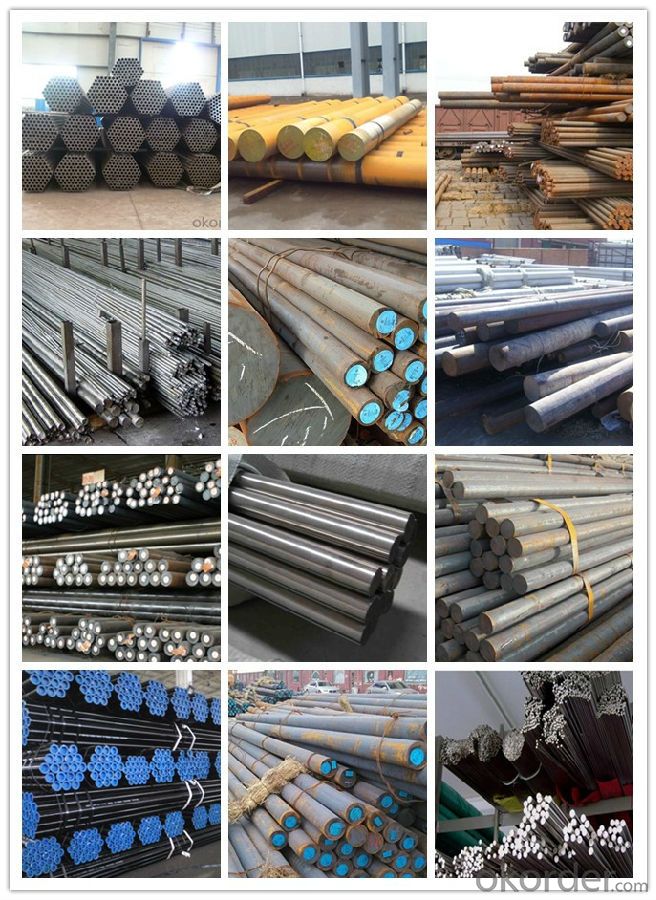
Workshop show
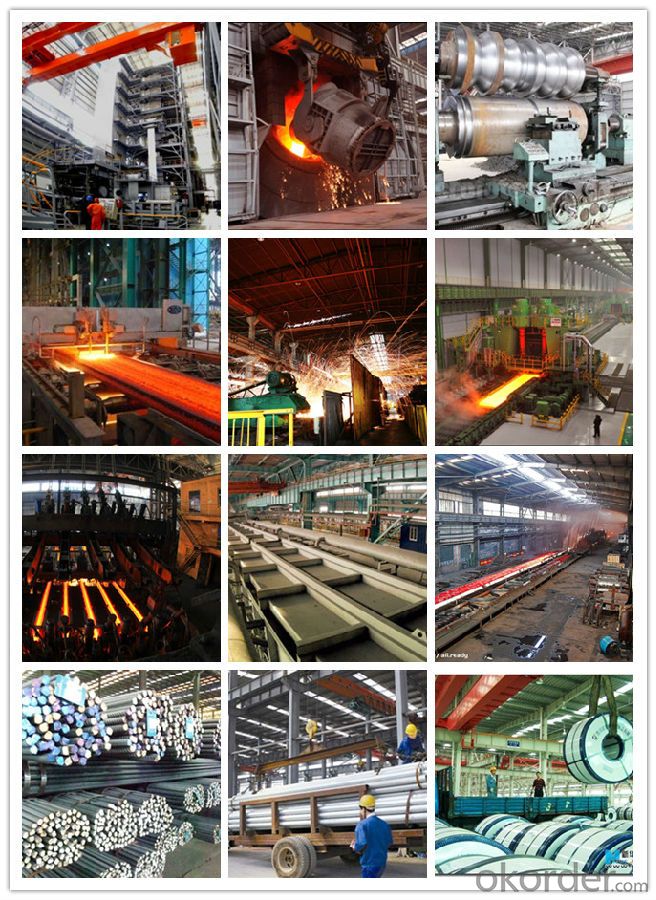
Shipping
1. FedEx/DHL/UPS/TNT for samples, Door-to-Door;
2. By Air or by Sea for batch goods, for FCL; Airport/ Port receiving;
3. Customers specifying freight forwarders or negotiable shipping methods!
Delivery Time: 3-7 days for samples; 5-25 days for batch goods.
Payment Terms
1.Payment: T/T, L/C, Western Union, MoneyGram,PayPal; 30% deposits; 70% balance before delivery.
2.MOQ: 1pcs
3.Warranty : 3 years
4.Package Informations: 1) EXPORT, In 20 feet (GW 25 ton) or 40 feet Container (GW 25 ton)
2)as customer's requirement
Why choose us?
(1) The leading exporter in China special steel industry.
(2) Large stocks for various sizes, fast delivery date.
(3) Good business relationship with China famous factories.
(4) More than 7 years steel exporting experience.
(5) Good after-sales service guarantee.
- Q: What are the common applications of stainless special steel?
- Stainless special steel, which is also known as stainless steel, possesses unique properties and characteristics that enable it to be extensively utilized in a wide range of applications. Some of the common uses of stainless special steel include: 1. In the construction industry, stainless steel is favored by architects and engineers for building facades, roofing, and structural components due to its high strength, corrosion resistance, and aesthetic appeal. 2. Within the automotive industry, stainless steel is extensively employed in the manufacturing of exhaust systems, mufflers, fuel tanks, and decorative trims, thanks to its resistance to corrosion, heat, and impact. 3. The aerospace industry utilizes stainless steel for the production of aircraft components such as frames, engine parts, and landing gear. This is due to stainless steel's exceptional strength-to-weight ratio, high-temperature resistance, and corrosion resistance, which make it suitable for the demanding conditions of aerospace applications. 4. In the medical industry, stainless steel is widely used for the manufacture of surgical instruments, implants, and medical equipment. Its biocompatibility, corrosion resistance, and ease of sterilization make it an ideal material for critical medical applications. 5. The food processing industry relies heavily on stainless steel for the manufacturing of storage tanks, pipes, and containers. This is because stainless steel possesses hygienic properties, corrosion resistance, and is easy to clean, ensuring the integrity and safety of food products. 6. The chemical industry makes extensive use of stainless steel due to its resistance to corrosion from various chemicals and acids. It is employed in the production of storage tanks, pipes, valves, and other equipment required in chemical processing plants. 7. In the marine industry, stainless steel is widely employed for manufacturing boat fittings, propellers, and underwater structures. Its resistance to corrosion from saltwater and harsh marine environments make it an excellent choice for marine applications. 8. The energy industry utilizes stainless steel in the manufacturing of pipelines, valves, and heat exchangers. Its high-temperature resistance, corrosion resistance, and durability make it suitable for use in power plants, oil refineries, and nuclear facilities. In summary, stainless special steel is a versatile material with exceptional properties, including corrosion resistance, strength, durability, and aesthetic appeal. This versatility allows it to find applications in various industries.
- Q: What are the different methods of surface etching for special steel?
- Some of the different methods of surface etching for special steel include chemical etching, electrochemical etching, and laser etching. Chemical etching involves using a specific chemical solution or acid to selectively remove material from the surface of the steel, creating a desired pattern or design. Electrochemical etching, also known as electroetching or electrolytic etching, utilizes an electric current to dissolve the surface of the steel and create the desired etched pattern. Laser etching, on the other hand, employs a high-powered laser beam to remove material from the surface of the steel, resulting in a precise and intricate etched design. Each method has its own advantages and suitability depending on the specific requirements and characteristics of the special steel being etched.
- Q: Can special steel be used in the production of springs?
- Yes, special steel can be used in the production of springs. Special steel, such as alloy steel, is often preferred for manufacturing springs due to its high strength, durability, and resistance to deformation. It allows for the production of springs that can withstand heavy loads, maintain their shape over time, and provide reliable performance in various applications.
- Q: What are the different types of corrosion that special steel can encounter?
- Special steel can encounter several different types of corrosion, including: 1. Uniform corrosion: This is the most common type of corrosion, where the entire surface of the steel corrodes evenly. It usually occurs when the steel is exposed to an aggressive environment, such as a corrosive chemical or high humidity. 2. Pitting corrosion: Pitting corrosion is characterized by localized corrosion attack in the form of small pits or cavities on the steel surface. It can occur due to the presence of chloride ions or other aggressive substances, and it can be particularly detrimental as it can lead to the formation of cracks. 3. Crevice corrosion: Crevice corrosion occurs in narrow gaps or crevices between steel surfaces, such as junctions, gaskets, or under deposits. It is caused by the restricted access of oxygen and the accumulation of corrosive agents, leading to localized corrosion and potential damage. 4. Galvanic corrosion: Galvanic corrosion occurs when two dissimilar metals are in contact with each other in the presence of an electrolyte. In special steel, this can happen when it is in contact with another metal in a corrosive environment, resulting in accelerated corrosion of the less noble metal. 5. Stress corrosion cracking: This type of corrosion occurs due to the combined action of tensile stress and a corrosive environment. It can cause the steel to crack and fail, even under relatively low stress levels. Special steel is often susceptible to stress corrosion cracking in specific environments, such as high chloride or acidic solutions. 6. Intergranular corrosion: Intergranular corrosion occurs along the grain boundaries of steel, usually due to the segregation of impurities during the steel's manufacturing process. It can weaken the material and lead to premature failure. To prevent or mitigate these types of corrosion, special steel can be treated with various corrosion-resistant coatings, such as paints, metallic coatings, or alloys with high resistance to corrosion. Additionally, proper material selection, design considerations, and regular maintenance can also help minimize the risk of corrosion in special steel applications.
- Q: How is special steel used in the production of cutting tools?
- Special steel is used in the production of cutting tools due to its exceptional strength, hardness, and durability. Its high carbon content and alloying elements enable it to withstand intense pressure, resist wear and abrasion, and maintain sharp edges for longer periods. This makes special steel ideal for manufacturing cutting tools such as saw blades, knives, drills, and chisels, ensuring precise and efficient cutting operations across various industries.
- Q: Can special steel be used in the rubber manufacturing industry?
- Yes, special steel can be used in the rubber manufacturing industry. It is commonly used for making molds, dies, and other components that are used in the production process of rubber products. Special steel provides durability, strength, and resistance to wear, which are essential properties required in the rubber manufacturing industry.
- Q: How does special steel contribute to the manufacturing of gears?
- Special steel plays a crucial role in the manufacturing of gears due to its unique properties and characteristics. Gears are mechanical devices that facilitate the transmission of power and motion between rotating shafts, and they need to withstand high loads, operate at high speeds, and maintain precise dimensions for smooth and efficient functioning. Special steel, with its enhanced mechanical properties and superior quality, provides the necessary strength, durability, and wear resistance required for gear manufacturing. One key aspect of special steel is its high strength and hardness. Gears often experience heavy loads and undergo significant stress during operation. Special steel, such as alloy steel or tool steel, offers exceptional strength, allowing gears to handle these loads without deformation or failure. Moreover, the hardness of special steel ensures that gears can withstand abrasive wear and prevent damage caused by external factors, such as friction and contact with other components. Special steel also contributes to the manufacturing of gears by providing excellent fatigue resistance. Gears are subject to repetitive cyclic loading, which can lead to fatigue failure over time if not properly designed and manufactured. Special steel, through its unique microstructure and composition, enhances the fatigue life of gears by minimizing the propagation of cracks and reducing the risk of failure, ensuring long-term reliability and performance. Furthermore, special steel offers excellent machinability and dimensional stability, two vital factors in gear manufacturing. The machinability of special steel allows for precise shaping and cutting of gear teeth, ensuring accurate dimensions and smooth gear operation. The dimensional stability of special steel helps maintain the gear's shape and integrity under various temperature and environmental conditions, ensuring the gear's performance remains consistent throughout its lifespan. In conclusion, special steel plays a significant role in the manufacturing of gears by providing the necessary strength, durability, wear resistance, fatigue resistance, machinability, and dimensional stability. Gears made from special steel can withstand high loads, operate at high speeds, and maintain precise dimensions, ultimately contributing to the efficient functioning of various machinery and mechanical systems.
- Q: Is special steel suitable for marine applications?
- Yes, special steel is suitable for marine applications. Special steel, also known as marine grade stainless steel, is specifically designed to withstand the harsh conditions of marine environments. It offers excellent resistance to corrosion, especially in the presence of saltwater, which makes it highly suitable for various marine applications. Special steel contains a higher percentage of chromium and nickel compared to standard steel grades, which enhances its corrosion resistance properties. Additionally, it is often alloyed with molybdenum, titanium, or other elements to further improve its resistance to pitting, crevice corrosion, and chloride-induced stress corrosion cracking. Marine applications require materials that can withstand high levels of moisture, saltwater exposure, and environmental factors like temperature variations and wave impact. Special steel meets these requirements by providing exceptional strength, durability, and corrosion resistance. Some common marine applications that benefit from special steel include shipbuilding, offshore oil and gas platforms, marine equipment and machinery, marine pipelines, and marine architecture and structures. Special steel is also used in the construction of naval vessels, submarines, and offshore wind farms. In conclusion, special steel is highly suitable for marine applications due to its superior corrosion resistance properties, durability, and strength. It effectively withstands the harsh conditions of marine environments and ensures the longevity and reliability of marine structures and equipment.
- Q: Can special steel be used in the production of musical instruments?
- Musical instruments can indeed benefit from the use of special steel. This type of steel, also known as tool steel or high-performance steel, has been specifically engineered to possess certain characteristics that make it suitable for specific applications. These characteristics include exceptional strength, durability, and resistance to both wear and corrosion. When it comes to musical instruments, special steel can be utilized in various components such as strings, springs, keys, valves, and reeds. For instance, piano strings are typically crafted from high-carbon steel, which provides the necessary strength and elasticity to produce the desired sound. Brass instruments like trumpets or saxophones have valves made from special steel alloys, which possess excellent corrosion resistance and can endure the repetitive movements required during play. Furthermore, special steel can also be employed in the production of instrument parts like guitar frets. Frets are metal strips embedded along the guitar's fingerboard, and they must be constructed from a material that is durable, wear-resistant, and able to maintain its shape over time. Special steel alloys, such as stainless steel or nickel-silver, are commonly chosen for this purpose. In summary, special steel brings forth a variety of properties that can improve the performance and longevity of musical instruments. With the utilization of this type of steel, manufacturers can create instruments that produce high-quality sound, withstand wear and tear more effectively, and enjoy a longer lifespan.
- Q: What are the different surface hardening methods used for special steel?
- Special steel can be enhanced in hardness and wear resistance through various surface hardening methods. These techniques are employed to cater to specific applications. Some commonly utilized methods for surface hardening special steel are as follows: 1. Carburizing: By introducing carbon into the steel's surface via heating it in a carbon-rich environment, such as a carbon-containing gas or liquid, carburizing is performed. The steel absorbs the carbon, resulting in a high-carbon layer on the surface. This process enhances the steel's hardness and wear resistance, making it suitable for applications demanding strength and durability. 2. Nitriding: Nitriding involves introducing nitrogen into the steel's surface. This is achieved by heating the steel in an atmosphere of ammonia gas. The nitrogen diffuses into the steel, forming a nitride layer on the surface. Nitrided steel exhibits increased hardness, improved wear resistance, and enhanced fatigue strength. It is commonly used in applications requiring high surface hardness, like gears, bearings, and tools. 3. Induction hardening: Induction hardening is a localized surface hardening method that entails heating specific areas of the steel using electromagnetic induction. The heated regions are then rapidly quenched, resulting in a hardened surface layer. Induction hardening is employed for components demanding high surface hardness, such as shafts, gears, and camshafts. It provides precise control over the hardened area, leading to improved wear resistance and fatigue strength. 4. Flame hardening: Flame hardening involves heating the steel surface using a high-temperature flame and quickly quenching it. This process creates a hard surface layer while leaving the core of the steel relatively unchanged. Flame hardening is commonly used for large and intricately shaped components, including axles, crankshafts, and machine tool slides. 5. Laser hardening: Laser hardening is a precise and localized surface hardening method that utilizes a high-energy laser beam to heat and melt the steel's surface. By moving the laser beam across the surface, a hardened layer is formed. Laser hardening provides precise control over the hardened area, resulting in improved wear resistance and fatigue strength. It is commonly applied to small and intricate components, such as cutting tools, molds, and dies. These are merely a few examples of the surface hardening methods frequently employed for special steel. Each method offers distinct advantages and is selected based on the specific requirements of the application. By utilizing these surface hardening techniques, special steel can be customized to meet the needs of various industries, including automotive, aerospace, and manufacturing.
Send your message to us
Special Steel DIN 1.2365 Steel Round Bar
- Loading Port:
- China main port
- Payment Terms:
- TT OR LC
- Min Order Qty:
- 30 m.t.
- Supply Capability:
- 10000 m.t./month
OKorder Service Pledge
OKorder Financial Service
Similar products
Hot products
Hot Searches
Related keywords
